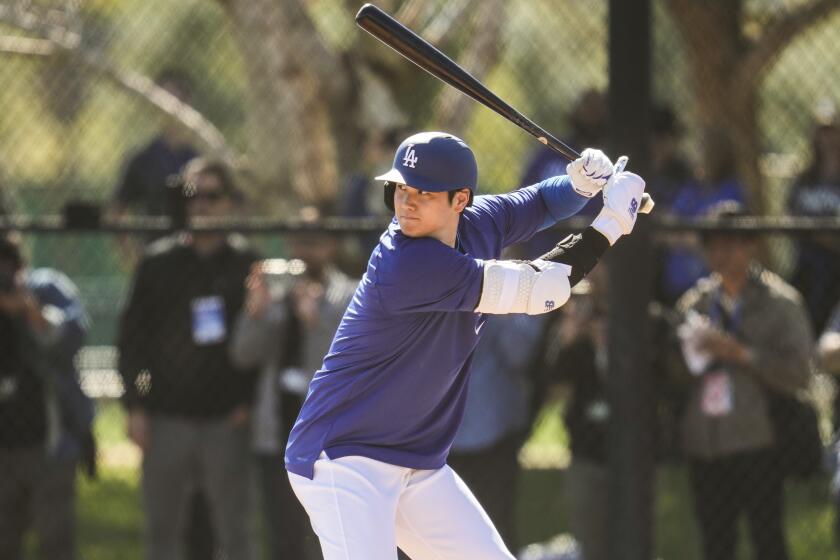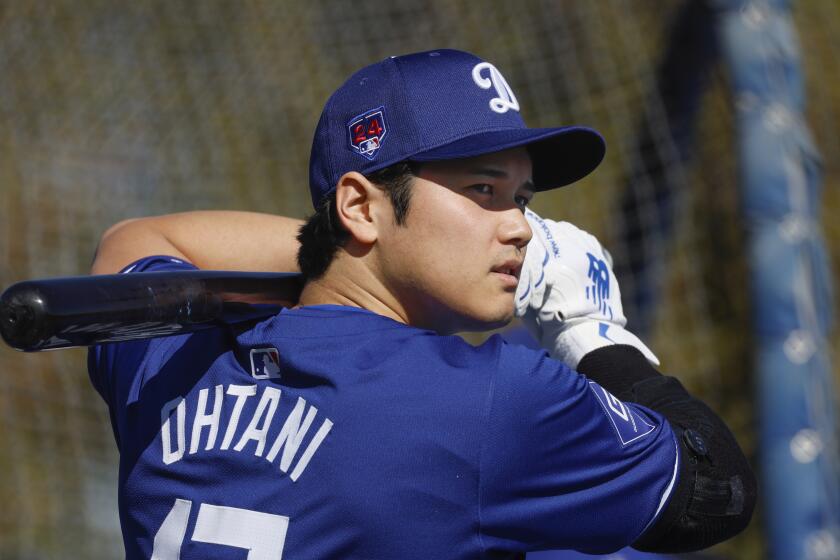Poised for improvement? Why Shohei Ohtani could be an even bigger offensive threat in 2024
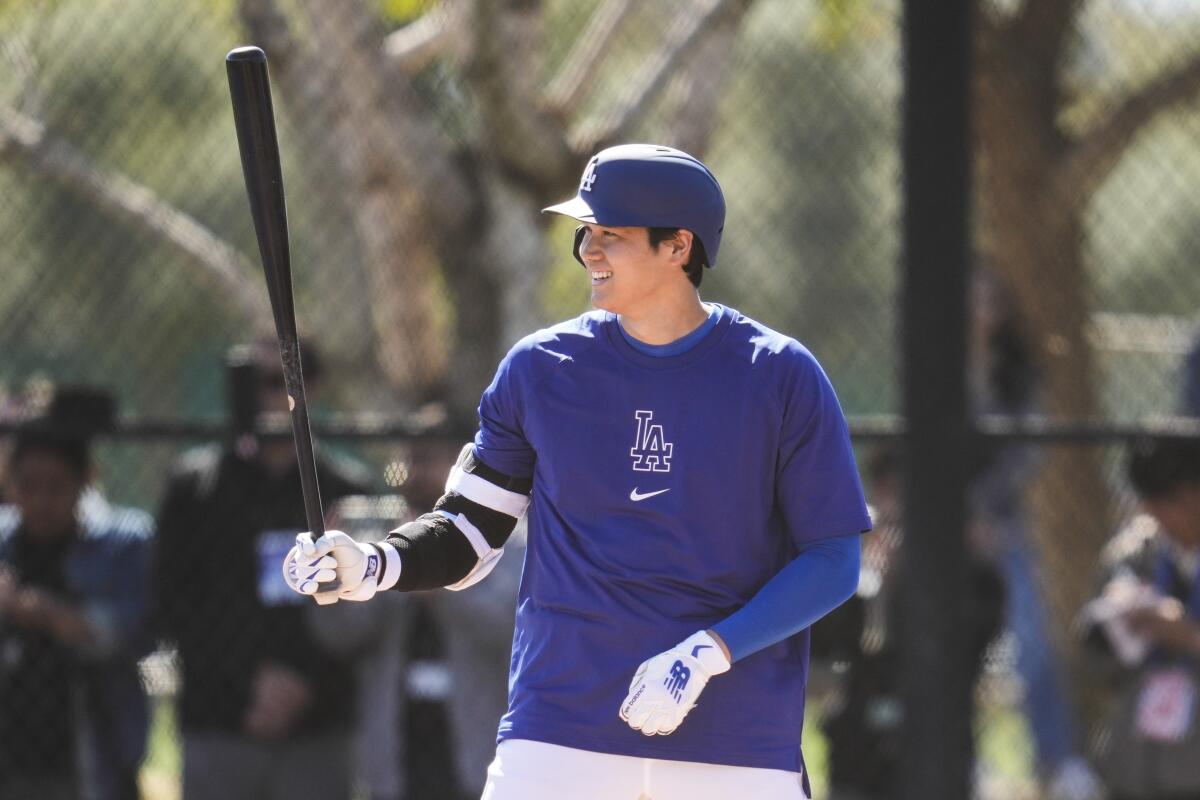
- Share via
PHOENIX — Of all the tools at the disposal of the Dodgers’ player performance department, a small rectangular machine called 1080 Sprint is one of their preferred methods for improving quickness and speed.
A portable resistance training device, 1080 Sprint attaches a motorized wire to a harness strapped around a player’s waist, slowing them down as they practice straight-line sprints and quick-twitch movements.
It’s like a modern version of running with a parachute tied to your back. The machine applies mechanical resistance to a player as they run. The hope is it will efficiently strengthen their stride, improve their acceleration and — in baseball — make them a higher-speed threat in the field and on the bases.
Taking live batting practice for the first time since undergoing elbow surgery, Shohei Ohtani dazzled a crowd of fans, reporters and Dodgers personnel.
Early this spring, Travis Smith, the Dodgers’ strength and conditioning coach, set up the machine on an open field at the team’s Camelback Ranch facility, and strapped the harness around Shohei Ohtani — the club’s new $700-million superstar acquisition.
Like everyone else in camp, Smith knew Ohtani possessed an unmatched combination of strength, quickness and speed.
What he wasn’t expecting: for Ohtani to literally break the machine, severing the resistance wire in two like an old, fraying string.
“That,” Smith later recounted, “I’ve never seen.”
The moment itself was comical, with Ohtani sheepishly grinning as Smith, manager Dave Roberts and special assistant Ron Roenicke laughed in amazement nearby.
The takeaway, however, was tantalizing — serving as another sign that, in a year Ohtani won’t pitch while recovering from Tommy John surgery, there might be more physical potential for him to tap into.
As a designated hitter-only this season, improvements upon his already elite offensive production might not be beyond the realm of possibility.
“He’s just so powerful, with strength and quickness,” Roenicke said, still wearing a look of disbelief while recounting the moment a few days later. “I’m sure they see that in the NFL. But you don’t see that very often in baseball, not with that kind of speed and strength. It’s different. He’s a different athlete.”
For most of his MLB career, Ohtani has expended that athleticism on both pitching and hitting. It helped make him a two-time MVP, and the league’s first true two-way star in roughly a century.
But, the dueling roles also pushed Ohtani to unprecedented physical extremes, forcing him to divide his time, effort and mental energy on two very different — but equally demanding — positions during his six-year tenure with the Angels.
It didn’t stop him from becoming perhaps the best player in the majors. It hardly appeared to limit his abilities during All-Star seasons in the last three years.
With Ohtani having no choice this season but to dedicate more focus to the offensive part of his game, many around Dodgers camp have speculated about what it could mean for his 2024 performance.
An increase in power? An enhanced level of consistency at the plate? More constant aggression on the bases? Maybe even a 40-homer, 40-steal season (something that has been accomplished only five times in MLB history)?
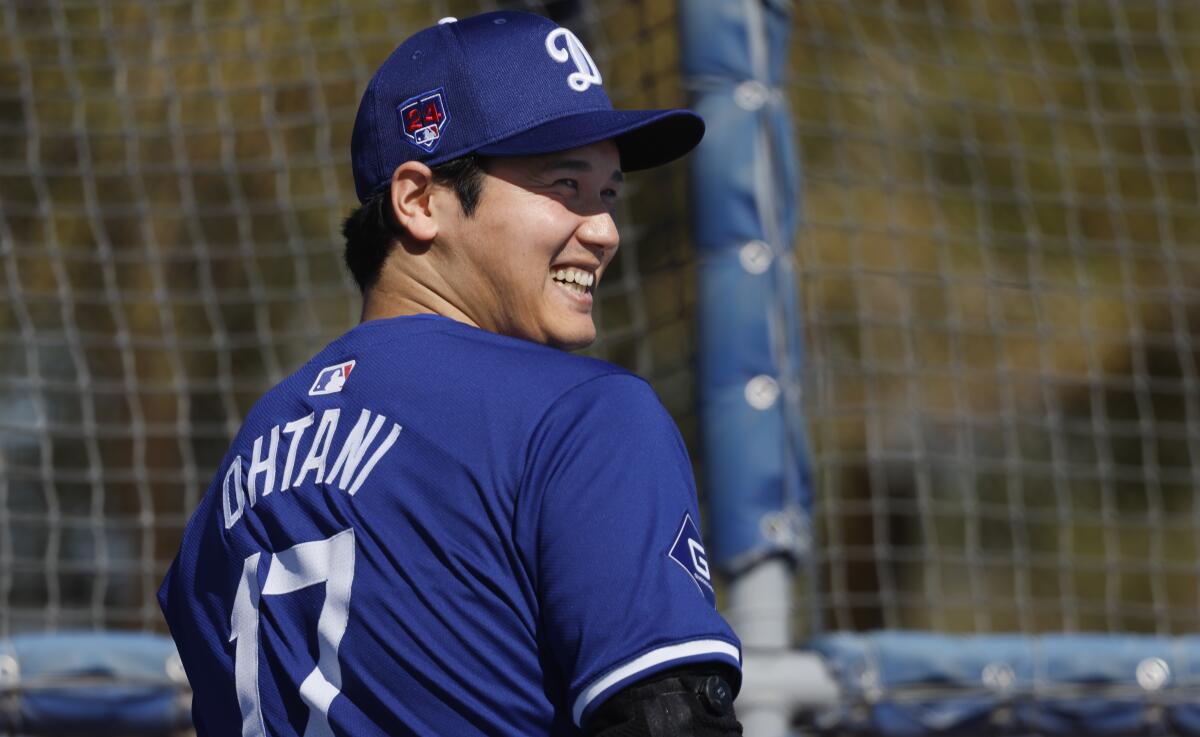
Less than a month out from opening day, the Dodgers are hoping that any of those lofty accomplishments could prove to be within Ohtani’s atmospheric reach.
“I would assume that it bodes better for him offensively,” Roberts said.
“Because he doesn’t have to work this year on the pitching part of it,” Roenicke noted, “he’s got a lot more time to work on other parts of his game.”
Added hitting coach Robert Van Scoyoc: “Obviously he’s been dominant, the best hitter in the sport, the last few years. But his mind, his focus being more singular on hitting, I think gives him a chance to really maximize everything.”
Ahead of Jeremy Reed’s first season as Angels hitting coach in 2019, he was admittedly unsure about what to expect from Ohtani.
Though the Japanese star was the American League Rookie of the Year the previous season, he also had his first Tommy John surgery at the end of that campaign. As a result, the Angels knew he wouldn’t pitch in 2019. And, after Ohtani sat out the opening month of his sophomore season while rehabilitating the injury, there was lingering uncertainty over what he could do at the plate.
“I didn’t know from a physical standpoint,” Reed said, “if there was going to be limitations.”
As it turned out, Ohtani not only hit that season, but did so at a well-above-league-average clip.
His .286 batting average was a point better than in his breakout 2018 performance, and remains the second-highest mark of his MLB career.
His 18 home runs and 43 extra-base hits were only small drops from the season before, albeit with 58 more at-bats.
His .848 on-base-plus-slugging percentage was a career low for a full season (excluding the pandemic-shortened 2020 campaign). His comfort level at the plate as an everyday MLB hitter, however, quickly blossomed, confirming Ohtani’s status as one of the game’s more talented offensive threats.
“It was pretty eye-opening,” Reed said, “that a player could still hit with that injury.”
This year, Ohtani will face similar circumstances.
The Tommy John surgery he underwent in September will keep him off the mound until 2025 but isn’t expected to impact his swing in the meantime.
His once strictly divided schedule can now be more allocated to offensive upkeep, particularly without the burdens of soreness and fatigue that accompany regular starting pitching appearances.
“He has embraced pitching and hitting, and I’m sure he’s going to miss not being able to go out there every fifth or sixth day to pitch,” Roberts said. “But I just really feel good about the way he is right now, and how he looks.”
Other factors are working in Ohtani’s favor.
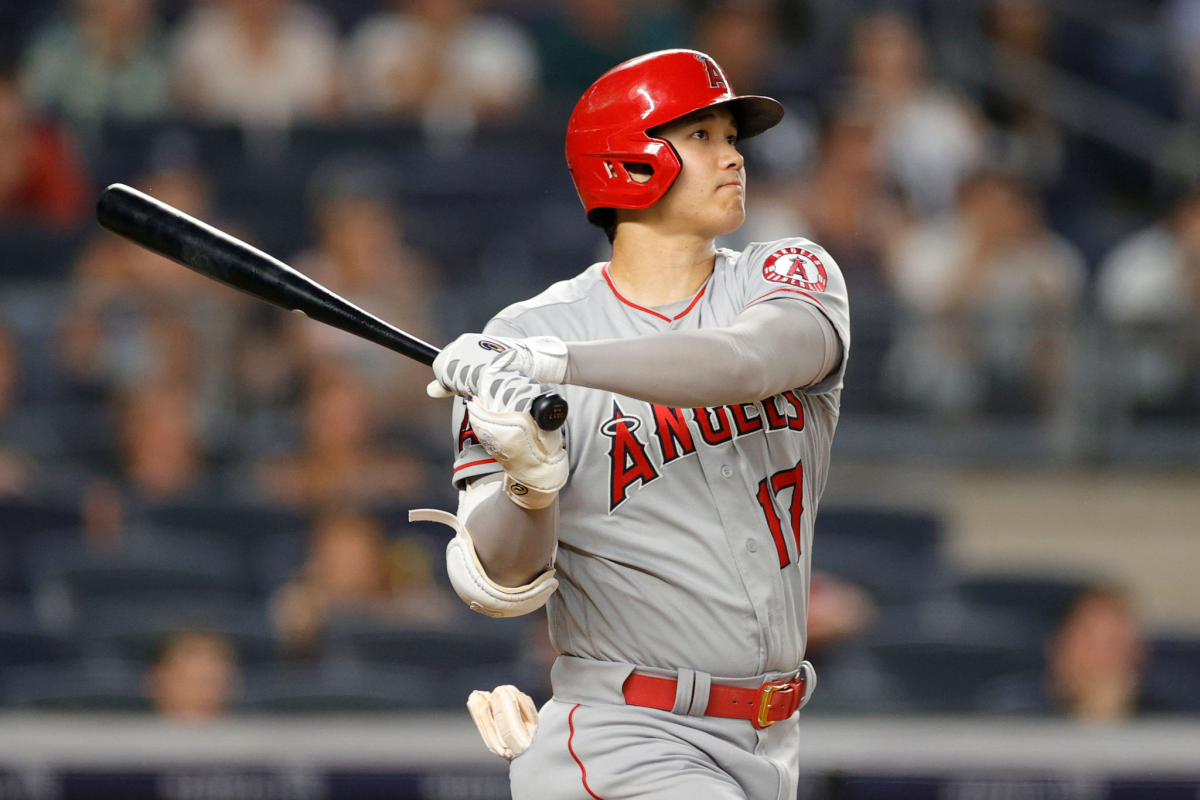
He now has his 2019 experience to lean on, giving him an idea of what to expect as he recovers from his second Tommy John procedure .
“I understand the flow [of the process], to a degree,” Ohtani said in Japanese at the start of the spring. “I think it will go smoother than last time.”
He is also more developed physically than he was in 2019, when the slugger was younger (he’s now 29), smaller (he had plenty of size and athleticism, but not the muscular mass and definition that defines his appearance now) and still learning how to succeed in the major leagues.
“I know he’s got more experience now,” said Dodgers third base coach Dino Ebel, who previously coached Ohtani with the Angels during his rookie year. “But he’s also gotten bigger … Visually, he’s just so strong.”
Joining the Dodgers also should give Ohtani more lineup protection and run-production potential.
“No disrespect to the hitters that were around him [in Anaheim],” Reed said. “But there were times Anthony Rendon wasn’t on the field, or times when Mike [Trout] wasn’t on the field due to injury. Now, you have a fairly deep lineup that’s surrounded by one after another. So there’s no breaks for a pitcher.”
And then there is the widely held expectation that Ohtani will increase his aggressiveness on the bases, where he won’t be as worried about saving energy for pitching.
“He would like to run, he would like to steal,” Roenicke said. “Whether that means 30 stolen bases, whether that means 50, I think with him the most important thing is, ‘Am I stealing in the times when the team needs me?’ He mentioned that to me.”
Add it all up, and longtime Ohtani observers such as Reed think the sky could be his offensive limit this season.
“We’re talking about a dynamic runner, a dynamic mover, with the strength and leverage to go with it,” Reed said. “I would never put any limitations on him. That’s how good he is. So if he went out there and had a 40/40 season, I would not be surprised. I would actually be like, ‘Yeah, I knew he could do that.’ ”
So, is there really another level for Ohtani — whose career highs in home runs (46) and steals (26) came in his first MVP season in 2021 — to unlock at the plate?
He would like to think so.
“I think there is more and more ahead,” he said.
He isn’t alone in that opinion.
Van Scoyoc insisted “there’s always things you can do better,” and that even the loftiest of expectations can be surpassed.
“There’s an opportunity there for him to make some improvements in his game offensively,” Van Scoyoc said. “We don’t really know what anyone’s ceiling is.”
Ebel, who has been one of several coaches to throw batting practice sessions to Ohtani this spring, believed that a season of only hitting could “free his mind up” over the course of 162 games.
“He’s still gonna do whatever he has to do on the pitching side later on, when he starts a throwing program and all that,” Ebel said. “But right now he’s just solely locked in on offense.”
Rival scouts concurred. One evaluator said a 40/40 campaign or 50-homer season could be realistic. Another thought Ohtani was capable of a 1.100 OPS or better.
Whether it all results to an actual uptick in production, of course, is another question.
With Shohei Ohtani coming off elbow surgery, the Dodgers will let the two-way star ramp up at his own pace.
One Dodgers official who was quizzed for Ohtani predictions recently said to ask again in a month, when the slugger — who will make his Cactus League debut Tuesday — will be at the end of his ramp-up for the regular season.
Roberts also hedged some of his optimism, acknowledging, “I don’t know how it’s going to translate as far as performance … But I think that’s more of splitting hairs.”
Indeed, the Dodgers don’t necessarily need a production increase from Ohtani.
They signed him simply hoping for more of the MVP-caliber numbers he was already producing — a target he hit repeatedly even while splitting his time pitching.
“The thing with Shohei is, as soon as you start to doubt something that he can do, he’s gonna prove you wrong,” Reed said. “So I think Shohei is gonna have a monster year. I think he’s gonna do things with the bat he might not have ever done.”
More to Read
Are you a true-blue fan?
Get our Dodgers Dugout newsletter for insights, news and much more.
You may occasionally receive promotional content from the Los Angeles Times.

